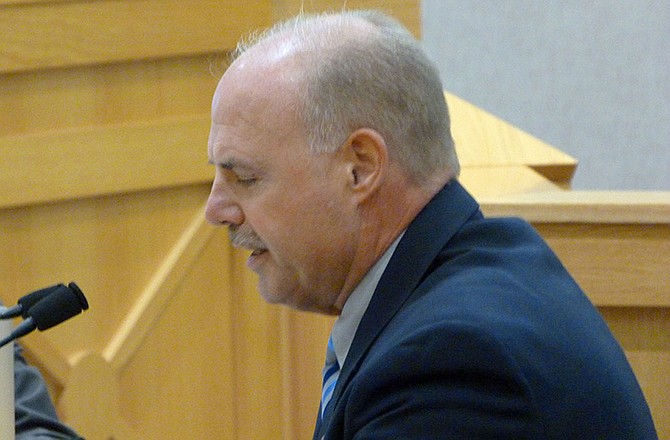A Camdenton state legislator is dissatisfied with how the Missouri Highway Patrol is responding to questions in the wake of the May death of a handcuffed man who was in the custody of a trooper.
State Rep. Diane Franklin, R-Camdenton, chairs a Missouri House of Representatives committee investigating the training officers should receive before patrolling the state's waterways.
The committee was appointed earlier this month after the drowning death of an Iowa man in patrol custody. The college student had been arrested on suspicion of boating while intoxicated and was in the custody of Trooper Anthony Piercy, when the 20-year-old jumped or fell from a patrol boat. The life jacket came off the handcuffed man, and he drowned.
The drowning prompted lake area legislators to look into how well officers are being trained in safe marine policing techniques since the merger of the Highway Patrol and Water Patrol three years ago.
Earlier this month, the committee held a hearing at the Capitol during which Highway Patrol leadership answered questions about how officers are trained, as well as if the merger of the Highway Patrol and Water Patrol three years ago has saved taxpayers money.
A second hearing last Tuesday at Osage Beach City Hall drew a standing-room crowd of lake area residents as well as retired law enforcement and first responders.
Highway Patrol Lt. Dave Wall, who spent more than 30 years supervising officers and patrolling the Lake of the Ozarks as a water patrol officer, said training today is less focused on unique techniques used on open waterways.
Wall said he now serves in an advisory and supervisory capacity for the Highway Patrol and "no longer has any connection with either the training or protocol" in the patrol's marine division.
When the Water Patrol existed, he said, recruits were required to pass courses that involved several hours of in-water training on a daily basis.
"Whether we were training new recruits or taking a refresher course as an experienced officer," Wall said, "the first thing we did every morning was get in the pool and swim, tread water, dive and so forth for several hours before we even cracked a book."
Wall said the rigorous in-water training usually would "separate those who were serious" about becoming Water Patrol officers from those who were more interested in other kinds of law enforcement.
Even after a recruit passed the training academy, Wall said, he or she was required to do another three months of active training under the supervision of an experienced "on-water officer."
Since the merger of the Highway Patrol and Water Patrol, that type of on-water training specific is not being given to new recruits, he said.
State Rep. Don Phillips, R-Kimberling City, a former Highway Patrol officer, asked Wall if he "was aware of any changes in the way training is being handled or if he had seen any specific directives about training" since the investigation began.
Wall replied, "I have not!"
In later testimony, Camden County Sheriff John Page said the merger never made sense to him because each law enforcement agency deals with unique types of individuals and requires different types of training.
"One's a water cop, and one's a road cop," he said. "And they deal with two different types of people," said Page, who has worked in Lake of the Ozarks law enforcement for more than 20 years.
He said he "always found the Water Patrol cooperative and extremely knowledgeable when it came to dealing with any kind of investigation that involved a crime on the water."
Page said he has great respect for the Highway Patrol and believes they do an "excellent job" in their jurisdiction. But he said he also believes the Highway Patrol cannot offer the type of "community policing" that was unique to the Water Patrol because they are involved with "wider issues."
"The main differences between the two agencies were their traditions," Page said. "The Water Patrol was a much smaller agency and were trained to be a much friendlier group because their job required it."
After the hearing at the lake, Franklin said she was "extremely disappointed" in the cooperation her committee is receiving from the Highway Patrol.
"There was a whole contingency of Highway Patrol hierarchy at the meeting, but when I asked if they would like to say anything to the committee, they refused," Franklin said.
"The uniform doesn't make the man. The two (former) Water Patrol officers we interviewed that day came there on their own during their day off to answer our questions," she said. "They knew exactly what it takes to patrol the state's waterways and were open about giving us their own personal history as well as that of the agency. And I find it extremely disappointing that the Highway Patrol isn't willing to do the same."
Franklin said the committee plans to hold at least two more meetings before making any decisions about the next step in determining if the merger is working.
"We will hold at least two more meetings with the next one scheduled for 10 a.m. Wednesday, Nov. 5, in the Capitol building," she said.
"At that meeting, we will be looking more closely into whether or not the merger is actually saving taxpayer dollars as promised."
In asking the Missouri General Assembly to approve the merger of the two agencies in 2011, Gov. Jay Nixon promised that the merger would save at least $3 million in state funds annually. However, Franklin said she has been advised by individuals involved in bringing the two agencies together that just the cost of outfitting the officers with new uniforms and equipment exceeded that amount.


